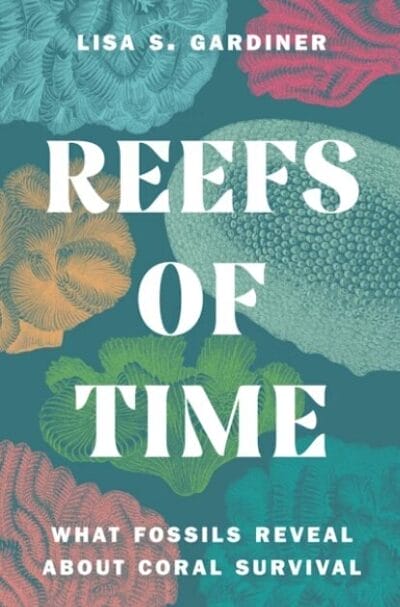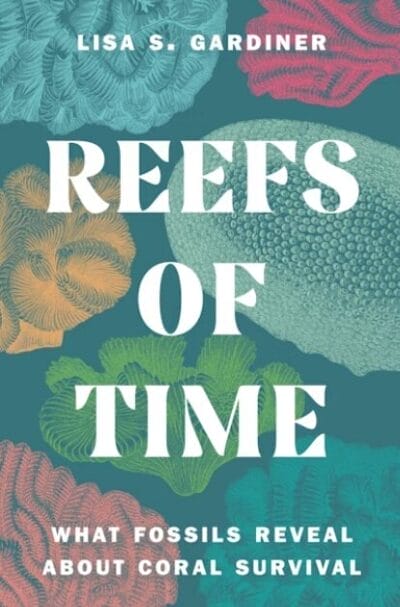
We look at this open and challenging examination of the world’s coral reefs and their prospects for survival. See more about Reefs of Time: What Fossils Reveal about Coral Survival by Lisa S. Gardiner here.
Reefs of Time: What Fossils Reveal about Coral Survival, reviewed
This is an important book, well written and about a vital aspect of our natural heritage and wild life. The author, Lisa Gardiner also presents some rays of hope too, looking at coral reefs and their potential for resilience in some situations. Sadly however, there are some locations, which despite surviving over a century of fluctuating tides, temperatures and other challenging conditions, then experienced massive and complete die offs when the conditions just proved too challenging.
The book does collate some positive and hopeful experiences of examples of where coral has survived, regrouped and revived. The trouble is that mankind just keeps nudging the needle higher and higher in terms of the degree and speed at which global waters are rising in temperature. These are clear and present examples of where the science illustrates that global warming is 100% a reality and is having wide, and terrible consequences. It is hard not to consider the politics of our time, sure there are climate change deniers, flooding the zone with bad science, to delay, defer and deny these real and hard facts. Equally, when Gardiner mentions the Paris Agreement and it’s potential to mitigate climate change, how can this even succeed when it is actively being undermined and withdrawn from.
None of these factors make this a bad book, very much the opposite, this book is well written, even handed, facts based, it is just saddening that we live in times where there are very real, negative consequences to denying climate change. Reefs are beautiful, wonderful things, and books like this help to explain and demonstrate why, however, like David Attenborough, trying to document the wonder and beauty of nature, while it is being exterminated around him, it can be hard to hold both of these threads in your hand at the same time. An important book, and wouldn’t it be great if humanity could stop destroying the natural world around it, so that our own future generations can actually see it for themselves.
More about Reefs of Time
With rising global temperatures, pollution, overfishing, ocean acidification, and other problems caused by humans, there’s no question that today’s coral reefs are in trouble. As predictions about the future of these ecosystems grow increasingly dire, scientists are looking in an unlikely place for new ways to save corals: the past. The reefs of yesteryear faced challenges too, from changing sea level to temperature shifts, and understanding how they survived and when they faltered can help guide our efforts to help ensure a future for reefs.
Lisa Gardiner weaves together the latest cutting-edge science with stories of her expeditions to tropical locales to show how fossils and other reef remains offer tantalizing glimpses of how corals persisted through time, and how this knowledge can guide our efforts to ensure a future for these remarkable organisms. Gardiner takes readers on an excursion into “the shallow end of deep time”—when marine life was much like today’s yet unaffected by human influence—to explore the cities of fossilized limestone left behind by corals and other reef life millennia ago. The changes in reefs today are unlike anything ever seen before, but the fossil record offers hope that the coral reefs of tomorrow can weather the environmental challenges that lie ahead.
A breathtaking journey of scientific discovery, Reefs of Time reveals how lessons from the past can help us to chart a path forward for coral reefs struggling for survival in an age of climate crisis and mass extinction.
More about the author
Dr. Lisa S. Gardiner is a science writer, educator, scientist, and speaker. Her second nonfiction book, Reefs of Time: What Fossils Reveal about Coral Survival, is now available. She’s also the author of the award-winning book, Tales from an Uncertain World: What Other Assorted Disasters Can Teach Us About Climate Change.
Lisa aims to help curious readers learn how our planet works and how our actions affect climate, oceans, and ecosystems. In addition to writing, she teaches workshops and works with science education projects to create tools for learning such as curriculum and museum exhibits. She has developed graphics for exhibits, illustrations for books, and science comics. Before moving to freelancing, Lisa led a team at the UCAR Center for Science Education where she managed projects funded by the National Science Foundation, NOAA, and NASA.
She holds a PhD in geoscience (with a focus on paleoecology) from the University of Georgia, an MFA in n
See more book reviews here.
